
views
- Avoid or excuse yourself from 1-on-1 interactions with them, and try to interact only in group settings.
- Keep the interactions you do have polite, formal, and brief so that they don’t get the wrong idea.
- If they keep pursuing you, have a private conversation with them where you compassionately tell them your own feelings and ask for some space.
Limiting Your Interactions

Limit your 1-on-1 time with them. Feelings often develop and progress the more time that we spend alone with someone, so respectfully avoid them and keep your 1-on-1 time brief to nip those feelings in the bud. Use vague excuses to end the conversation, like, “Sorry, but I’ve got to be somewhere.” Try not to say things like “I’ll see you later.” If possible, hang out in groups to make sure any time spent near the person who likes you is spent in the presence of others, as well, to provide a social buffer.
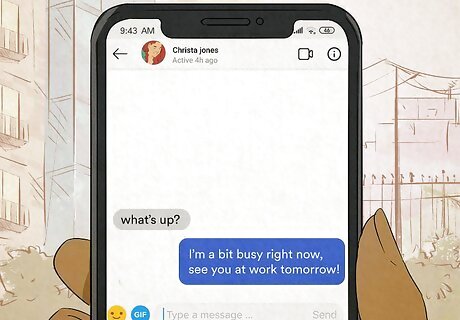
Keep communication direct and brief. Responding to texts or calls consistently and enthusiastically can send the wrong message, but that doesn’t mean you have to ghost them. Respond to calls or texts about work or school succinctly. If they ask about non-work or school-related issues, keep your answers short and on-topic. For instance, if they text you something like, “What’s up?” you could respond by saying “Sorry, I’m a bit busy right now, see you at work tomorrow!”

Stay polite and cordial to avoid conflict. Clinical psychologist Jennifer Guttman says, “It is still possible to maintain respect and authenticity in a conversation without being rude or abrupt.” Stay polite around people you don’t like to avoid hurting their feelings. Remember, they’re still a person, just like you. Guttman also says, “repeat back to them some portion of what they just said to show you’re listening” to stay respectful in conversation without participating too much. For example, you might still greet them if they greet you, and speak to them like you would any acquaintance. Avoid rolling your eyes, or glancing away like you’d rather be somewhere else, which are negative body language cues that can still be rude.
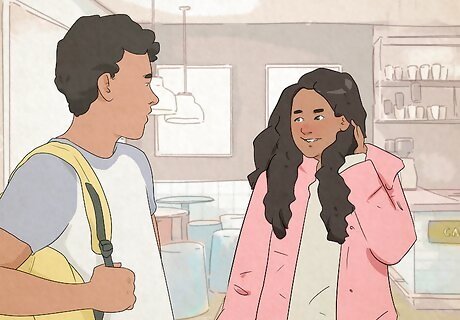
Avoid flirtatious touches or comments. Sometimes we can’t help but flirt with someone who we know likes us, even if it’s not mutual. Avoid flirting by keeping your hands to yourself and talking to the person as though they’re an acquaintance. Also, avoid overly familiar language like nicknames or using inside jokes, which might encourage them. Compliments can also be seen as flirting, so keep them formal and focused on work, school, or whatever context you’re in. Avoid complimenting their appearance or personality.
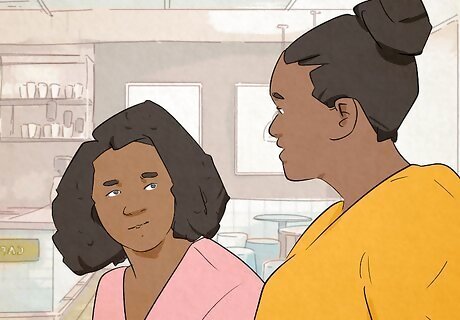
Breathe deeply to keep your emotions in check. Being around someone who likes you, but whom you don’t like, can be stressful. You may feel nervous, guilty, or even annoyed. If you see them, take a few deep breaths and remind yourself that your interaction is only temporary. If you feel nervous, overstimulated, or too stressed, excuse yourself with a simple, “I’m not feeling very well, I need some time to myself.”

Ask your friends for help avoiding the person. Your close, trusted friends can help you steer clear of the person, or even redirect conversations. If they see the person approaching you, they can intervene by either pulling you away or by interacting with both of you so you don’t have to be alone with them. If your friends aren’t around and you’re alone with the person, text your friends and ask them to call you, giving you an “exit” from the situation.

Give them some temporary space if you don’t dislike them. You might like them as a person, but not in the way they like you. In these instances, you might still keep interacting with them, but try to limit the number of interactions to keep some emotional distance between you. For example, let them initiate contact, and don’t be afraid to respond or even spend time with them if they do, but don’t reach out yourself. Or, excuse yourself from a group hang-out every now and then. Over time, if you’re not consistently present, their feelings might fade.
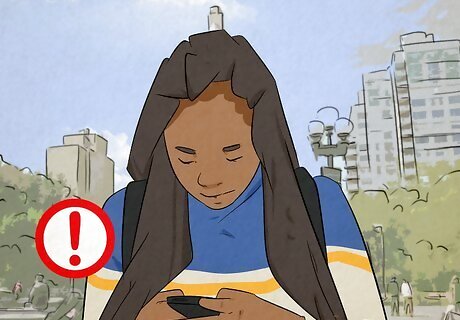
Avoid interacting with them on social media. If you’re not already friends with this person on Facebook, Instagram, or Twitter, consider making your accounts private so they can’t see your pictures or read your posts, to maintain your privacy. If you’re already friends, avoid interacting with their posts, or restrict whether or not they can see your profile, as a softer alternative to blocking or unfollowing them.
Letting Them Down Easy

Pull them aside to have a private talk about your dynamic. Even if you feel that you’ve been clear that you don’t want a relationship with this person, some people need to hear that directly, and sooner rather than later. This stops any confusion or doubts about your own feelings. Start by saying something like, “I get the feeling that—and please correct me if I’m wrong—you may have a crush on me. I’m flattered, but not interested in the same way. I hope that you understand.” Stay humble and friendly as you tell them you don’t want to date to make the situation feel less dramatic.

Be honest about your feelings and sensitive to theirs. Avoid sugar coating your feelings, making excuses, or giving the person false hope by suggesting there’s a chance. That said, don’t be cruel, mean, or overly harsh—they can’t help the way they feel. You might say, “I’m sorry, I just don’t like you in that way, and it wouldn’t be fair to either of us to keep this going.” Avoid the classic “I’m already in a relationship” excuse if that’s not true. You owe it to them and yourself to respect your own truth. Keep in mind that, though it’s hard, we all go through rejection—both rejecting others and being rejected—and it’s not the end of the world for them. EXPERT TIP Alicia Oglesby Alicia Oglesby Professional School Counselor Alicia Oglesby is a Professional School Counselor and the Director of School and College Counseling at Bishop McNamara High School outside of Washington DC. With over ten years of experience in counseling, Alicia specializes in academic advising, social-emotional skills, and career counseling. Alicia holds a BS in Psychology from Howard University and a Master’s in Clinical Counseling and Applied Psychology from Chestnut Hill College. She also studied Race and Mental Health at Virginia Tech. Alicia holds Professional School Counseling Certifications in both Washington DC and Pennsylvania. She has created a college counseling program in its entirety and developed five programs focused on application workshops, parent information workshops, essay writing collaborative, peer-reviewed application activities, and financial aid literacy events. Alicia Oglesby Alicia Oglesby Professional School Counselor Address romantic interest with kindness. If a friend likes you romantically but you only see them platonically, address this kindly but clearly. Note their positive qualities while conveying your feelings honestly. Explain why you value their friendship but don’t share romantic feelings so you both feel comfortable moving forward.

Use “I” statements to avoid placing blame. Focus on your own personal feelings to avoid insulting or making them feel bad. “I” statements tend to sound less accusatory and often result in the other party feeling less defensive than using “you” statements, while still conveying the message. For instance, rather than saying, “You seem weird to me,” say something like, “I just don’t have feelings for you in that way.” There’s no need to make them feel bad about themselves.
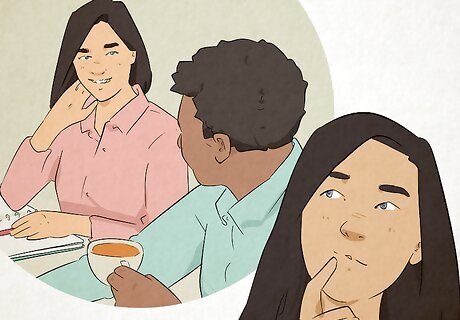
Take responsibility for leading them on, if necessary. Ask yourself if their feelings were an intentional result of your own actions, like if you flirted, gave them gifts, or even pursued them at some point. If that’s the case, apologize for these. For example, you might say, “I think I flirted with you before, and I’m sorry I sent the wrong signals. I’ll try to work on that.”

Offer your friendship if you don’t dislike them. Making your feelings clear doesn’t have to be the end of a relationship. If you like them as a person, tell them that, and let them know you’re still open to being platonic friends. Say something like, “Even though I’m not interested in a relationship, I’d really like to be your friend.” Be prepared for them to potentially turn down your offer. Their feelings for you may be too strong to accept friendship. If they tell you this, thank them for their honesty and respect their wishes.
Setting Boundaries
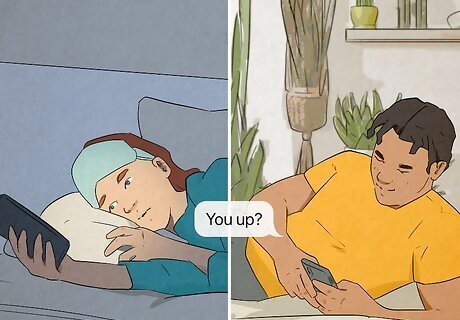
Avoid responding to texts or calls after a certain time. Limiting when and how you reply to their calls can help you set communication boundaries. You might only respond to a certain number of texts, or let calls made after dark go to voicemail. Definitely don’t answer texts that may have been made while the other person was drunk, and hang up on drunk calls, as well.

Stay firm in your decision, and don’t backtrack. Softening your own stance or letting your sympathy override your own comfort can hurt both you and the other person. Once you’ve made your feelings known, stay committed, and remind the other person of your stance when necessary. For example, if they ask you to reconsider, tell them it’s not an option, and that you’d appreciate more distance to help you both work through your feelings.
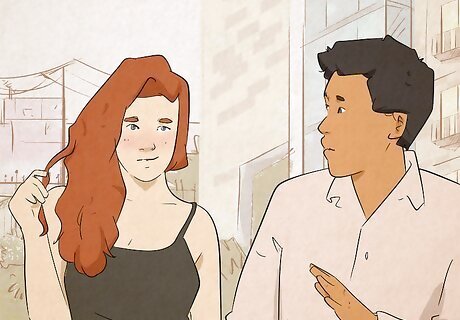
Remind yourself that you’re allowed to assert your boundaries. Clinical psychologist Jennifer Guttman reminds us that “Not everyone is going to like everyone.” You might feel guilty, and that’s natural, but it doesn’t make you wrong. They may be uncomfortable, but your boundaries exist to keep you safe and happy. If you feel badly about your decision, put yourself in their shoes. Would you want someone to be with you out of guilt or pity? Of course not!
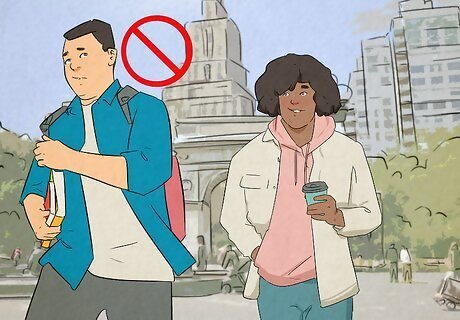
Remain cordial and friendly, so long as the other person is respectful. Though it can be easy to want to avoid this person at all costs to prevent awkward situations, it may hurt their feelings and cause them to seek you out even more for resolution. If you see them coming towards you, greet them and keep it moving. Not ignoring them does not mean that you have to linger, however. Keep your conversation to a minimum while still acknowledging their presence.
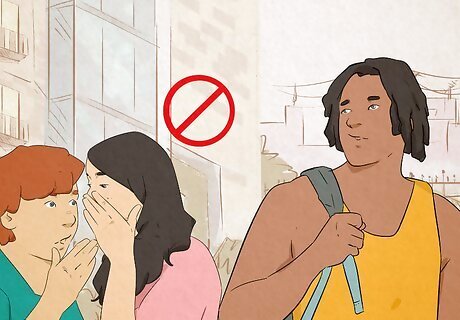
Avoid speaking badly about them to others. If this person is annoying, mean, or continues to make passes at you, it can be easy to want to gossip about them to others, but that only extends the problem. Focus instead on continuing to show them kindness and not adding fuel to the fire. Keep in mind that while you may not like them, other people might, and bad-mouthing them might only land you in hot water.




















Comments
0 comment